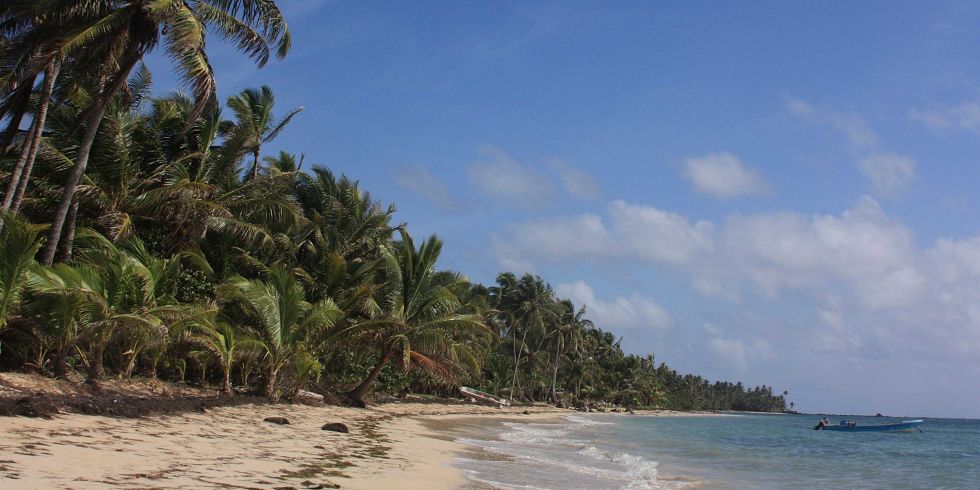Last year, after Christmas, I did something I had never done before but that is very much in vogue with the one percent, according to travel agents. Industry jargon hails it as “soft adventure,” but I prefer to call it “insulated risk.” In a nutshell, I vacationed at a five-star resort in what used to be called the Third World.
The trip occurred serendipitously. I had just spent an entirely risk-free week of tennis and golf at a family resort in the Caribbean, and I was facing the week between Christmas and New Year’s alone. (My significant other was 5,000 miles away, in Hawaii with his adult children.) A girlfriend invited me to join her at Mukul, a luxury resort on the so-called Emerald Coast of Nicaragua. With its open-air restaurants and café tables spread out under a vast thatch palapa, it reminded me of Costa Careyes in Mexico, or what Costa Careyes may have looked like in the 1960s: a wild, raw coast offering intoxicating isolation, before the arrival of mansions and private jets. But Mukul had comfort, too: a golf course, pools, and a spa, as well as the broadest, whitest beach I had ever seen.
I also thought it sounded pretty cool to go on holiday to Nicaragua. I would earn what Klara Glowczewska, T&C‘s travel editor, calls “bragging rights,” which travelers have long coveted, she said. And my limited knowledge of Nicaragua definitely put the country in the braggable category. I had childhood memories of scary-sounding headlines: armed uprisings, volcanoes, malarial rainforests, war, all of which could be safely absorbed from the safety of the palapa, should they still pose a threat.
My only concern was that Bahía Manzanillo, the bay beyond Mukul’s gorgeous white beach, looked on the internet as if it had some very significant surf, so before accepting I called the resort to see if the water was safe, since I love to swim. Oh yes, the receptionist assured me. Now the only impediment was a steady stream of negative commentary from my other half, in Hawaii.
“Why on earth would you go to Nicaragua? There are beaches closer to home. It’s dangerous, it’s baking hot, there are bugs.”
I am not a thrill-seeker. In fact, I am a lifelong sufferer of anxiety. But I am also a bit stubborn and Type A, one of those people who believes that “no” is just the start of a conversation. So “Hawaii,” as we shall call him, had me fired up. I wasn’t hoping to fall into a volcano (I am a mother of young children), but I was hoping for something—just what, I wasn’t sure.
On December 27, I traveled to Miami, whence American Airlines was supposed to fly me to Managua. At boarding time the passengers were told that a stewardess had called in sick, and immediately my anxiety started humming. Was it possible the stewardess just didn’t want to go to Nicaragua? What did she know that I didn’t? Was she really sick? Was it contagious? An hour later a steward clutching a Starbucks cup arrived to claps and cheers, and we were off.
The wild, raw coast offered intoxication isolation, before the arrival of mansions and private jets.
In Managua I transferred to a small propeller plane with peeling leather seats that had clearly seen better days. I tried to relax by looking down at the haze-covered mountains and red dirt roads twisting through jungle. Upon landing I was met by a driver from Mukul who coolly told me that our car, a white SUV, had both air conditioning and WiFi. Some crazy adventure. Suddenly, in front of us a villager walked with his oxen. What a great Instagram, I thought, clicking away, except my phone promptly seemed to stop working. (Ahem, Verizon.) Ha, I thought, fishing out my other cell, an AT&T iPhone, the one I keep for emergencies. This one worked. A bit smugly, I did feel that I was prepared for the developing world.
The gates of Mukul opened to immaculately manicured grounds where, unlike outside, livestock did not roam freely. I was met by my personal concierge, who showed me my accommodations, a charming bungalow with French doors. It was now the end of the day. Too late for a swim? According to the concierge, it was a long walk to the beach, but in 30 minutes I could take a shuttle bus. My Type A instincts kicking in, I grabbed my bikini and goggles and asked the concierge if she could kindly drive me herself (she was, after all, my personal concierge). Not only did she, she handed me a local cell phone on which to call her should I need anything else. I would come to nickname this device the “Bat Phone,” since over the next five days the poor woman was summoned at least as often as the Caped Crusader ever was.
